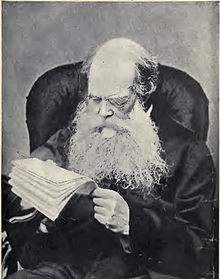E. Cobham Brewer
|
The Reverend Ebenezer Cobham Brewer |
|
|---|---|

E. Cobham Brewer from a 1922 book
|
|
| Born | Ebenezer Cobham Brewer May 10, 1810 Norwich |
| Died | March 6, 1897 (aged 86) Edwinstowe, Nottinghamshire |
| Nationality | English |
| Alma mater | Trinity Hall, Cambridge |
| Genre | Victorian reference works |
| Notable works | Brewer's Dictionary of Phrase and Fable, The Reader's Handbook |
Ebenezer Cobham Brewer (10 May 1810 in Norwich – 6 March 1897 in Edwinstowe, Nottinghamshire), was the author of A Guide to the Scientific Knowledge of Things Familiar, Brewer's Dictionary of Phrase and Fable, and The Reader's Handbook, among others.
E. Cobham Brewer was the son of Elisabeth, née Kitton, and John Sherren Brewer, a Norwich schoolmaster associated with the Baptist congregation of St Mary's Chapel in Norwich. His father kept a school in Calvert Street, Norwich, until 1824, when he opened a new academy in Eaton on the outskirts of Norwich. E. Cobham Brewer attended Trinity Hall, Cambridge, graduating in Law in 1836. He was ordained in 1838.
On returning to Norwich to work at his father's school, Brewer compiled his first major work, A Guide to the Scientific Knowledge of Things Familiar, first published around 1838–41. The book became immensely popular. It followed a simple format, organized like a catechism into questions and answers, and focused on explaining "the common phenomena of life" such as why snow is white, or a leaf green. In later parts of the book, Brewer's questions place scientific information in a theological context by asking readers to consider how scientific examples illustrate "the goodness and wisdom of God". Its sales may have funded the extensive travels in Europe he made later.
On returning to England in 1856, Brewer started on the work that was to become Brewer's Dictionary of Phrase and Fable. The dictionary was derived in part from correspondence with readers of his previous book. The first edition was published in 1870, and a revised edition appeared in 1894.
Of his methodology, Brewer wrote in the preface to the Historic Note-Book:
I have been an author for sixty years, have written many books, and of course have been a very miscellaneous reader. In my long experience I have remarked how little the range of "literary" reading has varied, and how doubt still centres on matters which were cruces in my early years. So that a work of this kind is of as much usefulness in 1891 as it would have been in 1830. I have always read with a slip of paper and a pencil at my side, to jot down whatever I think may be useful to me, and these jottings I keep sorted in different lockers. This has been a life-habit with me...
...
Wikipedia
